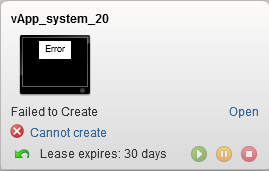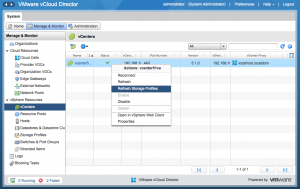So the other day, a bunch of us were asked the question: “A customer of ours has asked if the partial writes issue with linked clones that was found in View and fixed in 5.2 with SE sparse disks has also been fixed in vCloud Director Fast Provisioning with SE sparse disks” Cormac Hogan wrote a really great article on SE Sparse Disks, which can be read by clicking here. This is possibly the most exciting new storage feature in the vSphere 5.1 release. Space Efficient Sparse Virtual Disks (or SE Sparse Disks for short) were designed to alleviate two issues. Let’s describe these issues first of all. Problem Statement #1 – Let’s take a Guest OS running on a linked clone (View desktop if you will), and this Guest OS issues a 4KB write. vmfsSparse disk (which is the format used by traditional linked clones) has a block allocation […]
Tag Archives | vcd

vCloud vApp Design considerations – Part 1
This is carrying on from my session at PEX that I presented with Hugo Phan. A few people have asked if I could provide some information of vApp Use Cases, and what design considerations are involved in this. This is part 1 of a 4 part article. So lets start off with some logical considerations vApp Logical Design The list below shows some of the basic design considerations that you need to consider when putting together your vApp. Use the latest version of VMware Tools Select 1 vCPU as a default UNLESS specifically required Use VMXNET3 network adapters where applicable Secure Virtual Machines as you would standard VMs or physical Use standard Virtual Machine naming conventions Virtual Hardware version – CPU intensive workloads require HW version 9 One thing that people also need to bear in mind (and has been mentioned many times previously) is that a vCloud vApp is different […]

SPS NotEnoughLicenses error in vCloud Director debug log
Building a new vCloud Director environment today, I was experiencing issues trying to deploy a new vAPP. Every time I deployed a vAPP I got the error Failed to Create. So what was going on? I could deploy VMs in vSphere, vCloud Director was deploying the VMs in vSphere, and I could power them on manually from vSphere!?!. Clicking on the error gave me no information at all, and it showed that the VM was successfully being deployed too! I needed to take a look at the log files on the VCD cell to see whats happening. I SSH’d to the cell and issued the following commands: cd /opt/vmware/vcloud-director/logs cat vcloud-container-debug.log | grep -i error 2013-01-14 10:44:10,288 | ERROR | sf-activity-pool-2 | SpbmServiceImpl | SPS NotEnoughLicenses failure of 1 attempts to make SPS call at VC 2013-01-14 10:44:12,288 | ERROR | sf-activity-pool-2 | SpbmServiceImpl | SPS NotEnoughLicenses failure of […]

Refresh Storage Profiles in vCloud Director 5.1
I noticed a very handy new menu item in vCloud Director 5.1 today. Refresh Storage profiles. If you are creating Storage Profiles in vCenter, they dont show up in vCD immediately, which can be a bit frustrating if you are wanting to immediately assign those Storage Profiles. The steps below show you how to refresh the storage profiles, so that they are immediately available in vCD after you have created them. If your wondering how to create Storage Profiles in vCenter, Frank Denneman has written a really great article on storage profiles, its definitely worth the read. Login to vCD Click Manage & Monitor Select vCenters Right click on the vCenter you want to refresh and select Refresh Storage Profiles You will now see the storage profiles available when creating a new PvDC Please Note: You will not see any Storage Profiles displayed under Storage Profiles until they have been assigned to […]
vCloud Director 5.1 supported guest Operating Systems
I seen an internal email today regarding what Operating Systems are supported in vCloud Director 5.1. I always forget where to look for this information, so thought it would be useful to post here for a quick reference. The information listed below can be found in vCD 5.1 Users Guide on page 119. To find Windows Server 2012 support statement you will need to check the release notes. Note: All Virtual Hardware versions are version 9 unless stated otherwise 32 Bit Windows Windows 8 Windows 7 Windows Server 2008 Windows Server 2003 Windows Vista Windows XP Pro Windows 2000 64 Bit Windows Windows 8 Windows 7 Windows Server 2012 Windows Server 2008 R2 Windows Server 2008 Windows Server 2003 Windows Vista Windows XP UNIX/Linux/Solaris RHEL 2 thorugh to RHEL 6 SUSE Enterprise 8 through to 11 Open Enterprise Server CENTOS Ubuntu Linux Sun Solaris 8 – 11 (32 Bit) Sun […]
